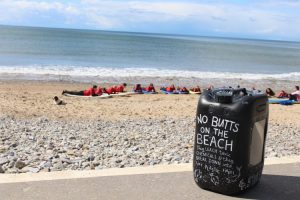
Plastic filled cigarette butts are the most littered item in the world, causing devastating consequences for marine wildlife.
Research has shown they are found on 80.3% of Welsh streets with many ending up polluting our seas and beaches.
Now Keep Wales Tidy has launched a major project to tackle the problem of marine litter in Wales.
To find out more, ASH Wales spoke to Nia Lloyd, Keep Wales Tidy’s Marketing and Communications Officer, about cigarette butts, their impact on the environment and the Marine Litter Project.
Can you tell us about the Marine Litter Project and how it will address the problem of cigarette litter?
The project is a partnership between Keep Wales Tidy, the Marine Conservation Society and the environmental consultants Eunomia. Its aim is to understand the reasons behind marine litter in Wales, including how so much smoking related litter ends up in our seas. Marine litter has become a global crisis and this project will help to identify local solutions. The recommendations from the project will help to inform Wales’ Marine Action Plan.
How much of a problem is cigarette-related litter in Wales?
Last year, cigarette ends were the fourth most common littered item found on beaches across Wales. And the Great British Beach Clean 2018 Report shows that cigarette stubs were the most common piece of litter found on beaches across the UK. Prevalence varies across different areas and during our recent All Wales Beach Clean, cigarette ends were the most common type of litter found in certain authorities. It is the most widespread form of litter found on Wales’ streets and many of the cigarette ends dropped on those streets will be washed into drains by the rain and wind and end up in our waterways and eventually in the sea. During our litter picks we see that the worst areas for cigarette litter tend to be around bins, in social areas and at bus stops. I have even seen nesting birds who had used the plastic fibers from cigarettes butts to build their nests.
How do cigarette ends harm the environment?
Cigarette ends are full of plastic and contain toxins left over from the nicotine. They can easily be ingested by fish and other marine wildlife who may mistake them for food, leading to inflammation of the digestive system and eventually death. Cigarette butts have been found in the guts of whales, dolphins, turtles and sea birds. When left to soak in water they release harmful toxins. In fact, if you leave one cigarette butt to soak in water for 96 hours, it will release enough toxins to kill half of the salt or fresh water fish that are exposed to it.

Do you think there is enough awareness of the environmental impact of cigarette litter on the marine environment?
There’s a lot of awareness out there about the harm that cigarettes cause to smokers’ health but not so much about the impact on the environment. Many smokers think of them as an item that is biodegradable, when in fact it takes around 15 years for one cigarette butt to be broken down. A lot of smokers flush their cigarette butts down the toilet without realising they may well end up in our waterways. There’s a lot of messaging out there to tackle litter or health information on smoking, but none that explains the impact of cigarette butts on the environment. Most cigarette bins are designed to be ‘hidden’ and they don’t have the sort of messaging that you might see on bins. Plastic is at the forefront of people’s minds now, but they don’t realise that cigarette butts contain plastic. They may be small but when you put all that plastic together it builds up to a huge problem.
What will the Marine Litter Project do to help tackle the problem?
We’ll be working with local communities, local authorities and schools to help spread the message about marine litter. It’s important that we get the message out there to future generations as well as to adults. The aim of the project is to establish a coordinated approach to tackling marine litter by environmental groups, local authorities and universities and to conduct in-depth research into the causes of it. We believe that Wales is small enough to take this coordinated action, but big enough to make a real difference.








